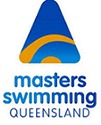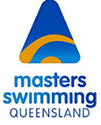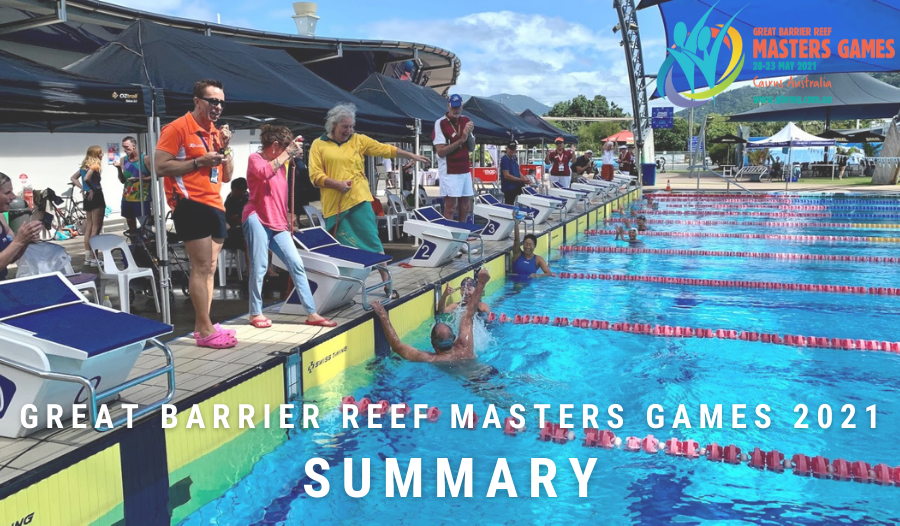
GBRMG21 Summary
MSQ President, Cheryl Brodribb:
Following on from a most successful MSQ State Championships Masters Swimming Queensland were pleased to host the swimming component of the 2021 GBRMG in Cairns. We were delighted with the number of entries, 280, which far exceeded our expectations. An exceptionally big thank you to our local working committee, Cairns Clams members Ted Bunt and Craig Needham as the host club, plus Tobruk Pool staff Kendell, Rhu, Jarrod and Nathan for all your work prior to and during the meet. You are all a delight to work with and our meetings were always a lot of fun. For this year we decided to add some fun to the meet and our announcer Craig made the meet fun with live interviews, live Facebook posts and giveaways.
Many GBRMG, State and National records were broken during the meet, and it has been confirmed that Tahnee has broken two-world Down Syndrome records, 200m IM World Record was 4:19:01 Swam 4:12:65, 200m Freestyle World Record was 3:38:72 Swam 3:32:29 – Congratulations Tahnee.
Our volunteers are an important part of our swim meets and we are incredibly grateful for your assistance. Thank you to the following: our Officials for your long days on pool deck, our Systems Administrator David Findlay who worked tirelessly to have results posted quickly, MSQ Recorder Martin Banks for his hours of work prior to the games, photographer, non-swimming timekeepers, and the ladies at the medal table.
A special thank you to Kathy, Deb, and Alice from the Far North Queensland Junior Swimming Association as our recorders. We are glad you enjoyed your first masters swim meet and look forward to having you as recorders for our 2022 State Championships.
To the competitors, a big thank you for your support of the event and the wonderful competition you all provided. We look forward to seeing you all for the 2023 GBRMG 25 – 28 May.
We also look forward to seeing you all in Cairns for the 2022 MSQ State Championships.
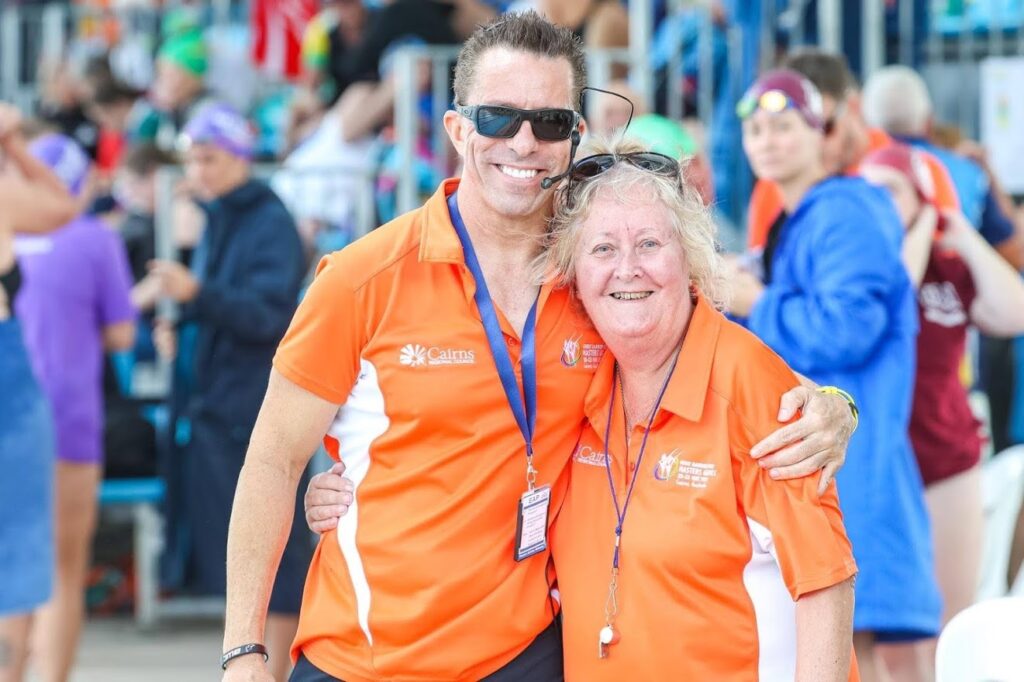
Craig & Cheryl
MSQ VP North & Meet Director, Ted Bunt:
Three days of wet and windy weather and I still enjoyed the meet. The Masters Swimming Crowd and Swimmers not attached to Masters Swimming Clubs ensured that the weather was not going to ‘dampen’ the enjoyment and effort.
The Tobruk Pool and Staff enjoyed the meet and we have secured a great working and commercial relationship. A relaxed yet formal dialogue exists and we – Tobruk Pool, MSQ and CLAMS are more than happy to host a variety of swim meets and activities. A debrief/breakfast with Pool Management and Staff reinforced a desire to work together.
Our Officials are the backbone to our meets and their enthusiasm and willingness to travel and work contributes to the success of all meets and a select group of volunteers gave up their time to assist with the meet.
The meet ran smoothly … a few comments:
- Self-marshaling was effective but there is still a need to check start and confirm swimmers were in the correct heats. There were two instances where swimmers jumped into vacant lanes and swam in the wrong heat;
- I received no feedback as far as the heats being run fastest to slowest. Comments were passed to others indicating a preference for slowest to fastest;
- The timing equipment and recording were fantastic;
- The relays were enjoyed by all;
- Swimmers and spectators abided by COVID protocols;
- No major medical episodes occurred. Swimmers with medical conditions identified themselves and withdrew from events if unwell; and
- There is a need to develop further policies and protocols for swimmers with disabilities.
I would also like to mention the great work done by the President Cheryl Brodribb that ensured that this was a very successful meet. Further I think we all enjoyed the efforts of our Announcer Craig ‘The Professor’ Needham.
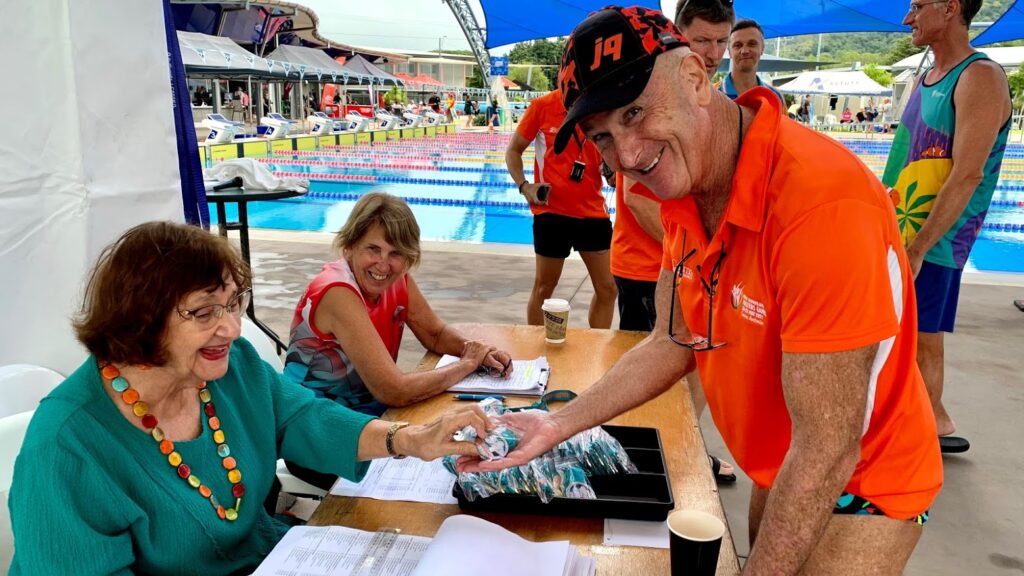
Ted receiving his medal
MSQ Director Recording, Martin Banks:
There had been much anticipation for the GBRMG in 2021 following a very successful 2019 meet and the recent lack of high quality meets due to COVID-19. Planning commenced back in March 2020 to develop a suitable meet program and approach. With other meets having to cancel or severely cut back the program due to the need for entrant limitations and physical distancing, GBRMG did not appear to be an issue due to the relative low numbers of attendees in the past. This was in no way a reflection of the quality or perception of the meet; it was just a smaller, more relaxed meet that was held in a remote location.
The program was based on the previous meet with a few key changes. The 400m event on day 1 had allowed a swimmer to choose the stroke they compete in and is swum all together. This is a recording and officiating challenge, and swimmers may be swimming a 400m breaststroke against a 400m freestyle competitor. The five 400m events were split out into separate events, with the original intention to allow an entrant to choose only one 400. The remainder of the program was shuffled a little to allow different stroke and distance preferences in the combination. Days 2 and 3 were set to start with 100m and 50m events rather than a slower and longer event to get some excitement at the beginning of the day. The now standard fast to slow heats order was also introduced. The practice will be maintained to develop alternate programs each time the meet is run that will suit others who may have felt disadvantaged by the previous meet.
The session format was kept the same with a shorter day 1 allowing for people to arrive or come and swim a late event after work, a full day 2 as there is plenty of time in the day, and a shorter day 3 to allow time for results, presentations and socialising, with flexibility given to allow people to get to flights or do sight-seeing in the region. Based on previous numbers the formula would work.
It was decided to continue offering nine individual events (average three per day) with the same relay events. With many events over three days of racing, swimmers would need to consider spacing and timing when nominating. The meet might not be about swimming PBs for all events, but to be strategic in event selection to maximise a combination approach – medals/points and some PBs, etc.
In 2019 we had 137 swimmers compete. To our surprise we received 280 nominations which gave the organising committee a little over a week to determine any adjustments that needed to be made. One oversight that was made was inadvertently allowing swimmers to enter multiple 400m events. What we have learnt is that people are very keen to participate in the longer events and we need to find a way to offer them more regularly. A number of people entered three or four 400m events. This pushed the meet timeline to a finish time past 8:00PM in the evening. All but approximately 25 entrants were entered in day 1 events. The 200IM was moved to day 2 and the day 1 session times were altered to start earlier and finish later, and we encouraged people to check-in for their swims and inform of withdrawals early.
Local timing system operators were brought in for the 2021 meet. In previous years one recorder operated and controlled the meet with little assistance. This addition allowed the Meet Recorder to focus on the program, results, and relay entries. The results and medals functions were extremely busy with four people required at times to post results and hand out medals. These roles were extremely important as they are the interface to our swimmers. They chat as they check their results and collect their medals telling stories of the higher medal getting away from them, a great PB, or what they might be doing after the meet. The traditional podium presentations are not possible, but the volunteers in these roles aimed to make each person feel like they were standing up in front of the applauding crowds.
At the outset the marshaling approach was for self-marshaling, with plenty of instruction and guidelines communicated to swimmers to assist them. Marshaling flowed very well and did not hold up the meet at any time, but with some volunteers not aware of self-marshaling, the function reverted to a traditional marshaling approach. Self-marshaling will continue to be adopted at meets and is likely to be standard.
Despite all the new features and the threat of restrictions imposed or cancellation as a result of recent outbreaks, or bad weather, the meet ran smoothly with great success, and ran to schedule even with the high numbers induced extended timeline. Many were excited by the buzz around the pool at the start of the meet. As with State Championships, fast to slow heats allowed people to see the faster and more experienced swimmers in the water before they had to get up there. It gave the less experienced and older swimmers a visual queue that their heat was coming up.
All competitors loved the meet and performed very well winning swags of Nemo medals and taking out multiple records. In fact, 245 Games records, 14 Queensland records, 7 Victorian records, 4 South Australian records, 4 national records, 20 Games relay records and 2 Down Syndrome World records were set over the three days. What a great effort! Many people have provided feedback that the meet was great, the pool was awesome to swim in, and the approach was very well accepted. The standard of records was not high in all events prior to this meet, but with the large number of competitors and the excellent standard of swimmers, they have now been set at a very competitive level. All are looking forward to the next GBRMG meet!
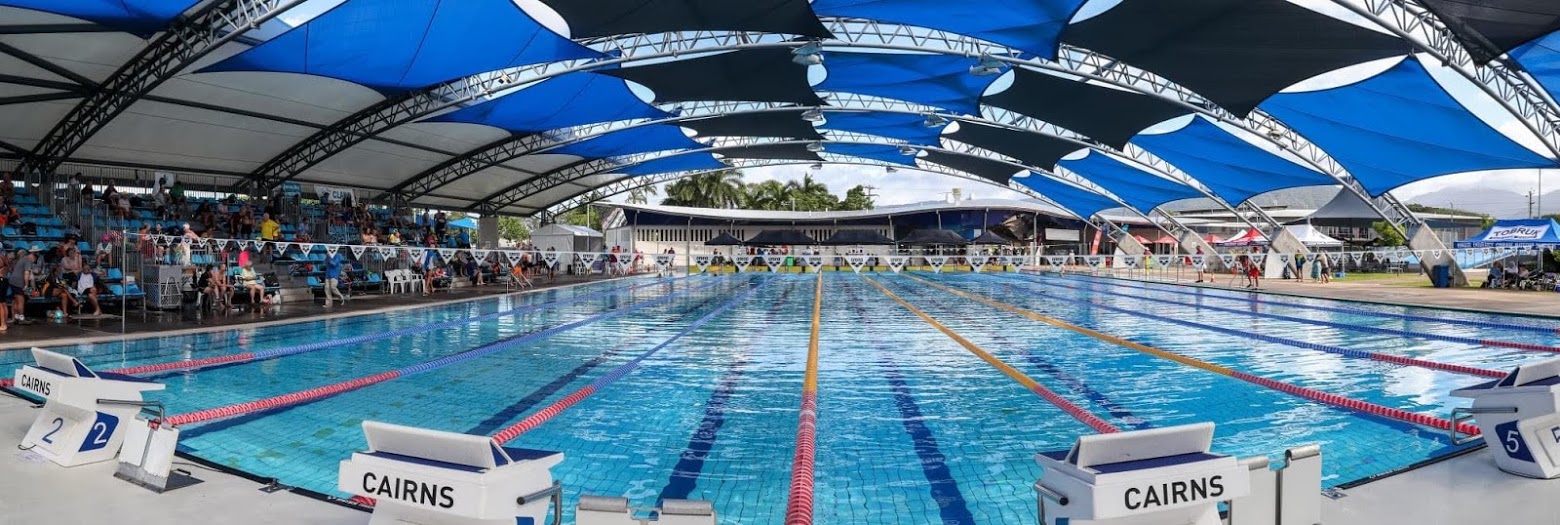
Statistics:
Masters swimmers love some good statistics. Below are some random stats pulled from the MSQ systems, but please note that some of these statistics exclude non-MSA members if the stat is club-based or Fina-based. If you are a non-Masters Swimming Australia swimmer and would like to join, please go to the following website.
Please also note that with the huge amount of Games records broken, there is still a bit of work that needs doing before being able to produce a new list. A final list will be released in due course.
| Entrants:
· Total entrants – 280 · Women – 139 · Men – 129 · Withdrawals – 12 · Total MSA Relays – 75 · Total Unattached Relays – 61 |
Unattached (non MSA) entrants:
· Top 5 rankings – 17, 19, 28, 42, 62 · Top 100 – 11 · Top 200 – 6 · Top 300 – 11 · Relays – 61 |
| Top 10 Team Scores | Top 10 Relay Scores | |||||
| 1 | University of Queensland Masters | 1,394 | 1 | University of Queensland Masters | 300 | |
| 2 | Noosa Masters | 895.5 | 2 | Noosa Masters | 140 | |
| 3 | Miami Masters | 639 | 3 | Sutherland Sandbern | 94 | |
| 4 | Darwin Stingers Masters. | 547 | 4 | Miami Masters | 76 | |
| 5 | Sutherland Sandbern | 445 | 5 | Darwin Stingers Masters | 72 | |
| 6 | Long Tan Legends Masters | 427 | 6 | Port Douglas Cyclones Masters | 70 | |
| 7 | Belgravia Masters Team | 420 | 7 | Long Tan Legends Masters | 66 | |
| 8 | Redlands Bayside Masters | 411 | 8 | Belgravia Masters Team | 66 | |
| 9 | Port Douglas Cyclones Masters | 403 | 9 | Redlands Bayside Masters | 46 | |
| 10 | Malvern Marlins | 384 | 10 | Malvern Marlins | 40 | |
| Men – Top 5 Team Scores | Women – Top 5 Team Scores | |||||
| 1 | University of Queensland Masters | 693 | 1 | Noosa Masters | 578 | |
| 2 | Miami Masters | 416 | 2 | University of Queensland Masters | 549 | |
| 3 | Sutherland Sandbern | 367 | 3 | Darwin Stingers Masters | 409 | |
| 4 | Noosa Masters | 279.5 | 4 | Malvern Marlins | 384 | |
| 5 | Sunshine Coast Masters | 272 | 5 | Port Douglas Cyclones Masters | 310 | |
| Club Average – Small (3-6) | |||||
| Total Points | Per Entrant | Per Entry | Entrants | ||
| 1 | Doncaster Dolphins | 194.5 | 64.8 | 7.2 | 3 |
| 2 | Cotton Tree | 242 | 60.5 | 6.9 | 4 |
| 3 | Ipswich City Masters | 235 | 58.8 | 6.5 | 4 |
| 4 | Brisbane Southside Masters | 224 | 56.0 | 8.6 | 4 |
| 5 | Powerpoints | 223 | 55.8 | 8.3 | 4 |
| 6 | North Sydney Masters | 163 | 54.3 | 7.1 | 3 |
| 7 | Townsville Aquaholics | 216 | 54.0 | 6.5 | 4 |
| 8 | North Mackay Sinkers Masters | 316 | 52.7 | 7.2 | 6 |
| 9 | Barbarians Masters Team | 287 | 47.8 | 6.8 | 6 |
| 10 | Brisbane Northside Masters | 134 | 44.7 | 8.4 | 3 |
| 11 | Mossman Meteors Master | 178 | 44.5 | 8.5 | 4 |
| 12 | Tuggeranong Masters Act | 129 | 43.0 | 5.9 | 3 |
| 13 | Maryborough Masters | 224 | 37.3 | 4.9 | 6 |
| 14 | Bunna-barra Masters | 131 | 32.8 | 4.9 | 4 |
| 15 | Cairns Clams Masters | 126 | 25.2 | 4.8 | 5 |
| Club Average – Large (7-21) | |||||
| Total Points | Per Entrant | Per Entry | Entrants | ||
| 1 | University of Queensland Masters | 1394.5 | 73.4 | 11.0 | 19 |
| 2 | Miami Masters | 639 | 63.9 | 7.5 | 10 |
| 3 | Belgravia Masters Team | 420 | 60.0 | 8.1 | 7 |
| 4 | Redlands Bayside Masters | 411 | 58.7 | 7.3 | 7 |
| 5 | Port Douglas Cyclones Masters | 403 | 57.6 | 9.0 | 7 |
| 6 | Malvern Marlins | 384 | 54.9 | 7.7 | 7 |
| 7 | Darwin Stingers Masters. | 547 | 49.7 | 6.9 | 11 |
| 8 | Long Tan Legends Masters | 427 | 47.4 | 5.8 | 9 |
| 9 | Cairns Mudcrabs Masters | 332 | 47.4 | 7.7 | 7 |
| 10 | Sutherland Sandbern | 445 | 44.5 | 8.7 | 10 |
| 11 | Sunshine Coast Masters | 349 | 43.6 | 7.4 | 8 |
| 12 | Noosa Masters | 895 | 42.6 | 6.9 | 21 |
| 13 | Hervey Bay Masters | 284 | 40.6 | 6.9 | 7 |
| 14 | Rats Of Tobruk Masters | 257 | 36.7 | 6.1 | 7 |
| Women FINA Points – best 5 performances
|
|||||
| Fina | Pts Rank | ||||
| 1 | KADY IBELL | QUQ | 25-29 | 4157 | 1 |
| 2 | TRACY CLARKSON | QBN | 70-74 | 3360 | 1 |
| 3 | ELAINE SNG | QRC | 60-64 | 3298 | 19 |
| 4 | PAULA GILES | VMV | 65-69 | 3126 | 121 |
| 5 | CHRISTINA SCOLARO | QUQ | 50-54 | 3115 | 8 |
| 6 | IRENE CATS | QPC | 35-39 | 2772 | 1 |
| 7 | MARSHA REDDIEX | QCD | 75-79 | 2769 | 1 |
| 8 | MAKO WATANABE | QCN | 25-29 | 2720 | 34 |
| 9 | ANDREA MCNEIL | VMV | 55-59 | 2677 | 1 |
| 10 | CAROLINE MAKIN | NTN | 50-54 | 2659 | 13 |
| Men FINA Points – best 5 performances
|
|||||
| Fina | Pts Rank | ||||
| 1 | STEPHEN BERTING | QUQ | 40-44 | 3790 | 10 |
| 2 | LACHLAN MCDOWELL | VMH | 40-44 | 3740 | 48 |
| 3 | MARK SMEDLEY | SAM | 60-64 | 3560 | 28 |
| 4 | JOHN MCKAIG | QTA | 50-54 | 3412 | 42 |
| 5 | ROD LAURIE | VVM | 60-64 | 3327 | 127 |
| 6 | DARIUS SCHULTZ | VPP | 25-29 | 3306 | 36 |
| 7 | MARTIN BANKS | QUQ | 50-54 | 3274 | 8 |
| 8 | NIGEL FANNING | VPP | 45-49 | 3159 | 127 |
| 9 | LIAM MELLETT | NSA | 25-29 | 3102 | 127 |
| 10 | JUSTIN GILES | QBB | 30-34 | 3071 | 1 |
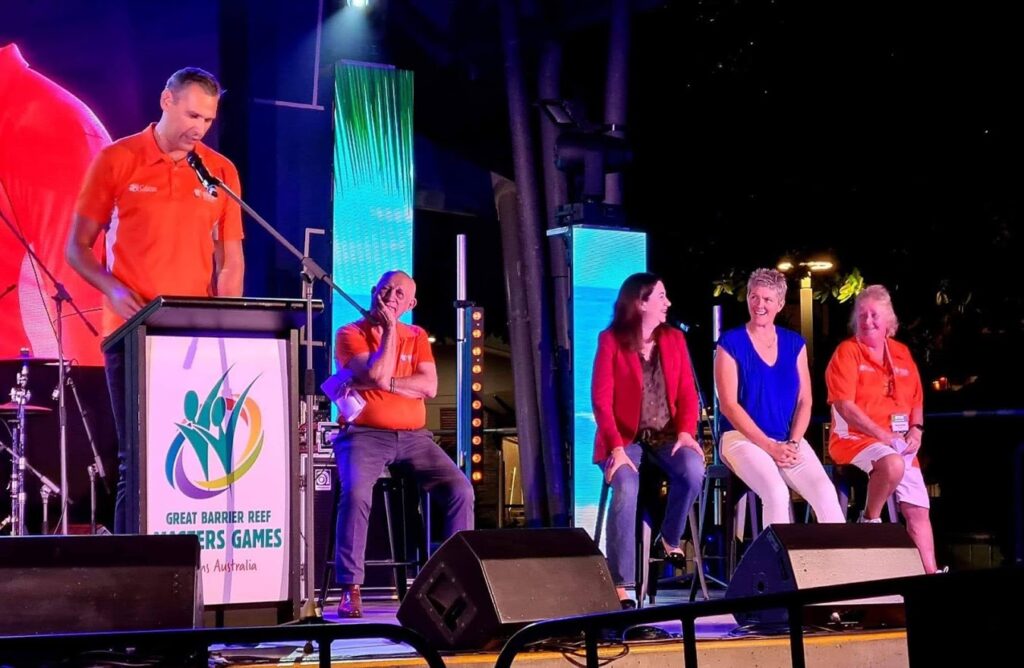
Cheryl, Natalie Cook and Qld Premier, Annastacia Palaszczuk at the Opening Ceremony
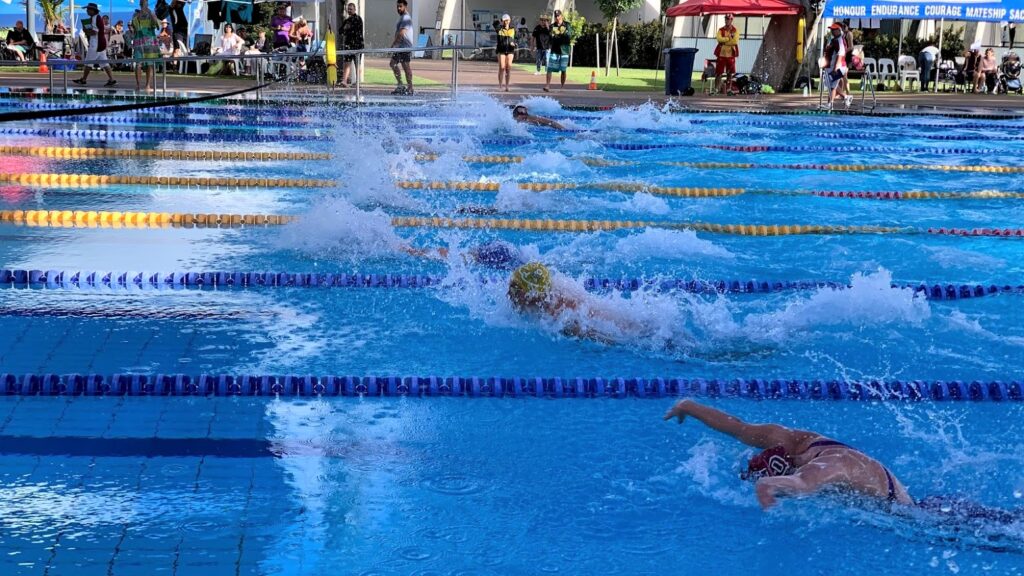
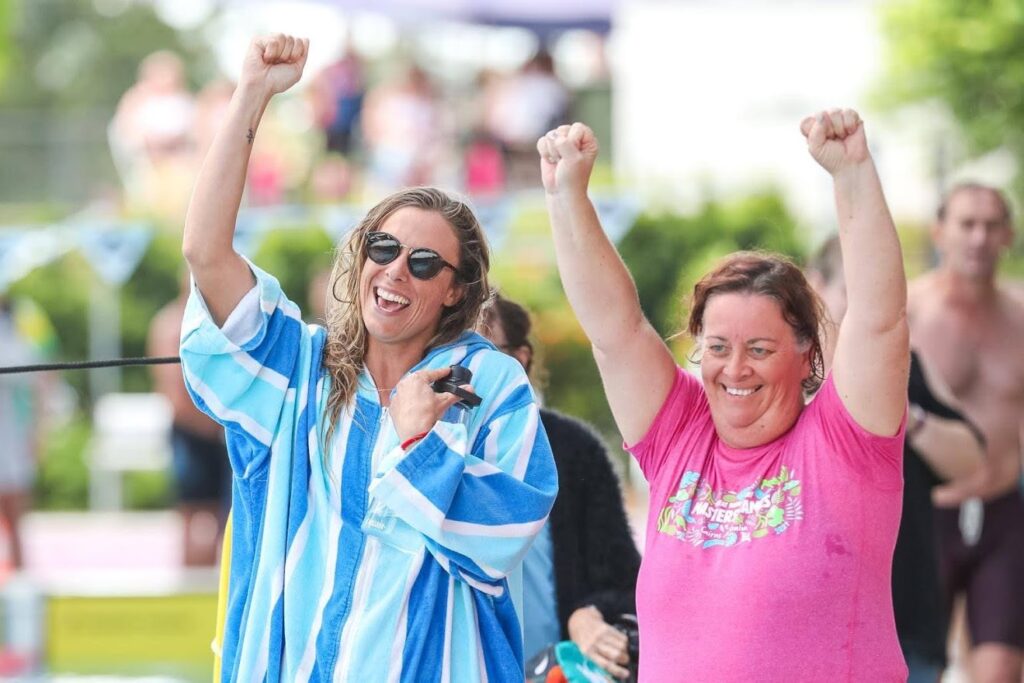
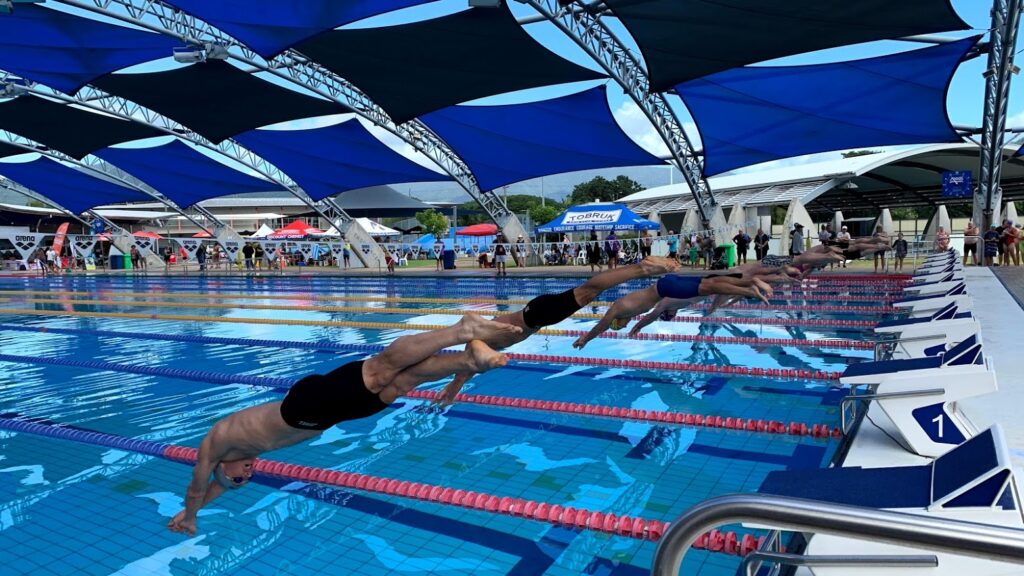
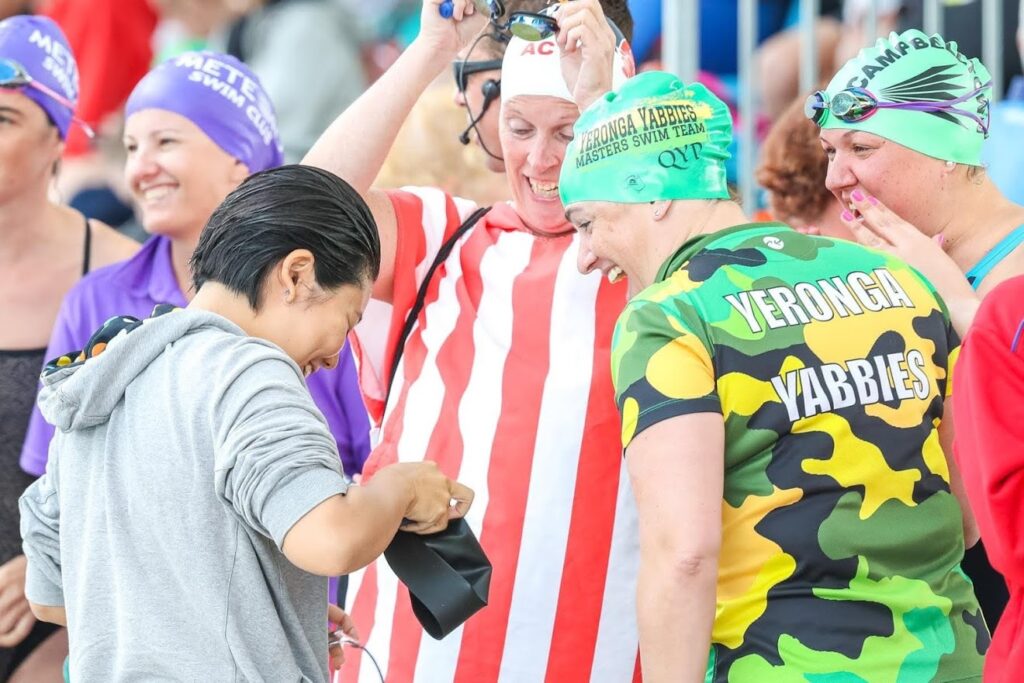
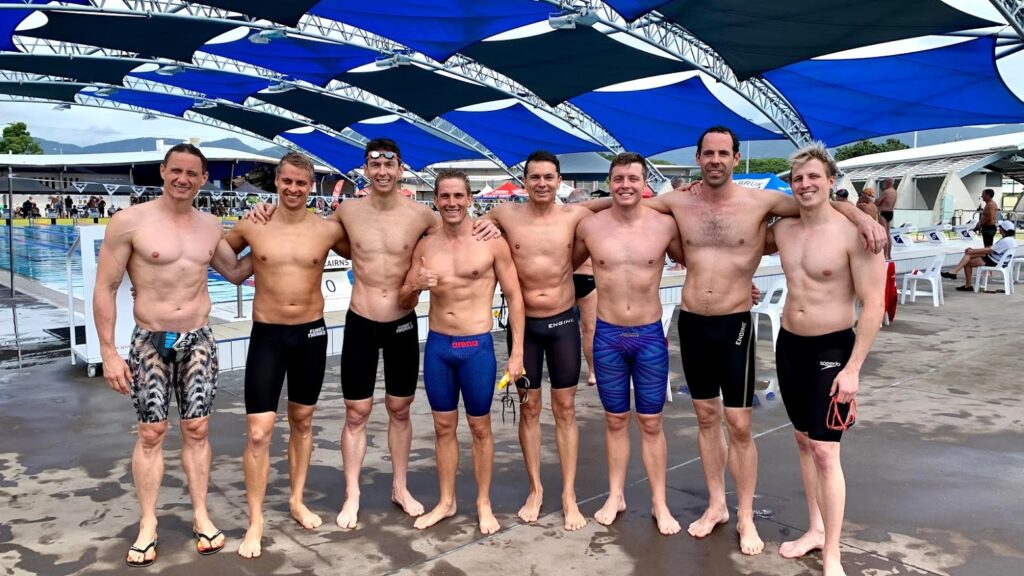
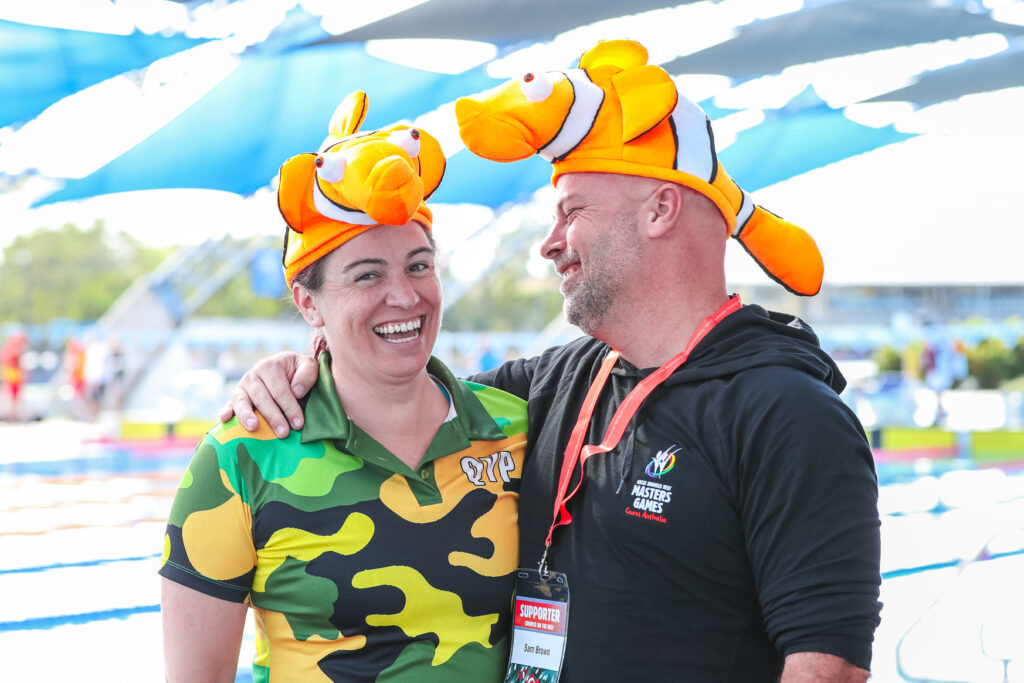
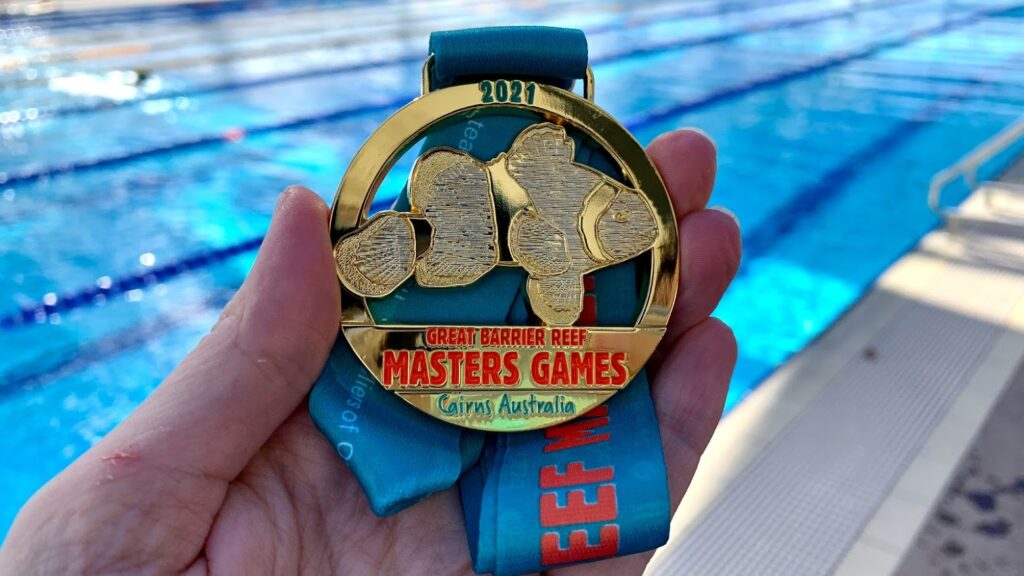
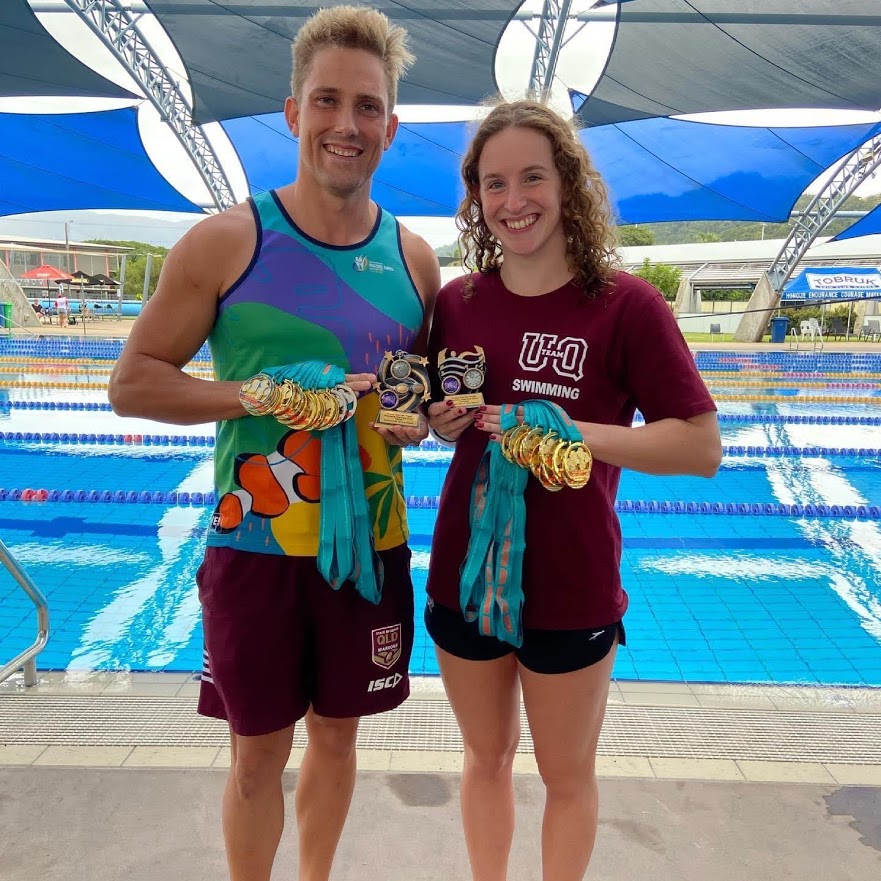
Justin and Kady, ‘Swimmers of the Meet’
